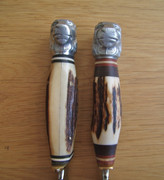This knife was bought by a Dutch man in the late '50's or early 60's as a souvenir, and from what i learned from his daughter is that it spent the rest of it's days forgotten in a drawer inside it's sheath.
When i bought it the blade was quite pitted and almost black from all those years inside it's leather sheath, and it still had it's factory "edge" of about 60-65 degrees inclusive.
I chose to regrind the blade by hand to a very shallow full convex zero edge with an apex that fits the 25 degrees inclusive slot on my Tormek WM200 angle guide, using only a new sheet of 400 grit wet & dry and WD40 as a lubricant on a rubber backing.
This removed most of the blackened pitting & solved the edge problem in one go.
Also glued the fiber washers together and sanded them flush again (some had expanded somewhat over the years), and polished the brass guard a bit.
You can click each picture 2 X for more detail.














Together with a similar Scout knife made by Gebr.Lützenkirchen under their Seal brand from the same time frame, and which shares the exact same aluminium lion head pommel.
Also notice the difference in stag handle manufacture: the Anton Wingen knife is still done the old way with 2 pieces of stag halves joined with brass pins, while the one made by Gebr.Lützenkirchen uses the newer one piece method.






Specs:
Post-war model, probably made in the late 1940's or during the 1950's
Overall length: 8.54 inch (21.7 cm)
Blade length: 4.57 inch (11.6 cm)
Max. blade thickness (ricasso): 4.8 mm
Steel: hot drop-forged carbon steel
Handle material: stag, fiber washers, brass guard & aluminium pommel.
Sheath: leather
After disassembling the knife i discovered a tang stamp of an anvil with (possibly) a hand holding a hammer.
Now as you know these blades were hot drop forged, and Anton WIngen Jr. seems to have had it's own forge up until the 1980's, but maybe this one was done by drop-forging specialist Felix, also in Solingen.
Would have to contact them to find out, as they are still in business.



Some old Anton Wingen Jr. Solingen advertising material:





When i bought it the blade was quite pitted and almost black from all those years inside it's leather sheath, and it still had it's factory "edge" of about 60-65 degrees inclusive.
I chose to regrind the blade by hand to a very shallow full convex zero edge with an apex that fits the 25 degrees inclusive slot on my Tormek WM200 angle guide, using only a new sheet of 400 grit wet & dry and WD40 as a lubricant on a rubber backing.
This removed most of the blackened pitting & solved the edge problem in one go.
Also glued the fiber washers together and sanded them flush again (some had expanded somewhat over the years), and polished the brass guard a bit.
You can click each picture 2 X for more detail.














Together with a similar Scout knife made by Gebr.Lützenkirchen under their Seal brand from the same time frame, and which shares the exact same aluminium lion head pommel.
Also notice the difference in stag handle manufacture: the Anton Wingen knife is still done the old way with 2 pieces of stag halves joined with brass pins, while the one made by Gebr.Lützenkirchen uses the newer one piece method.






Specs:
Post-war model, probably made in the late 1940's or during the 1950's
Overall length: 8.54 inch (21.7 cm)
Blade length: 4.57 inch (11.6 cm)
Max. blade thickness (ricasso): 4.8 mm
Steel: hot drop-forged carbon steel
Handle material: stag, fiber washers, brass guard & aluminium pommel.
Sheath: leather
After disassembling the knife i discovered a tang stamp of an anvil with (possibly) a hand holding a hammer.
Now as you know these blades were hot drop forged, and Anton WIngen Jr. seems to have had it's own forge up until the 1980's, but maybe this one was done by drop-forging specialist Felix, also in Solingen.
Would have to contact them to find out, as they are still in business.



Some old Anton Wingen Jr. Solingen advertising material:







